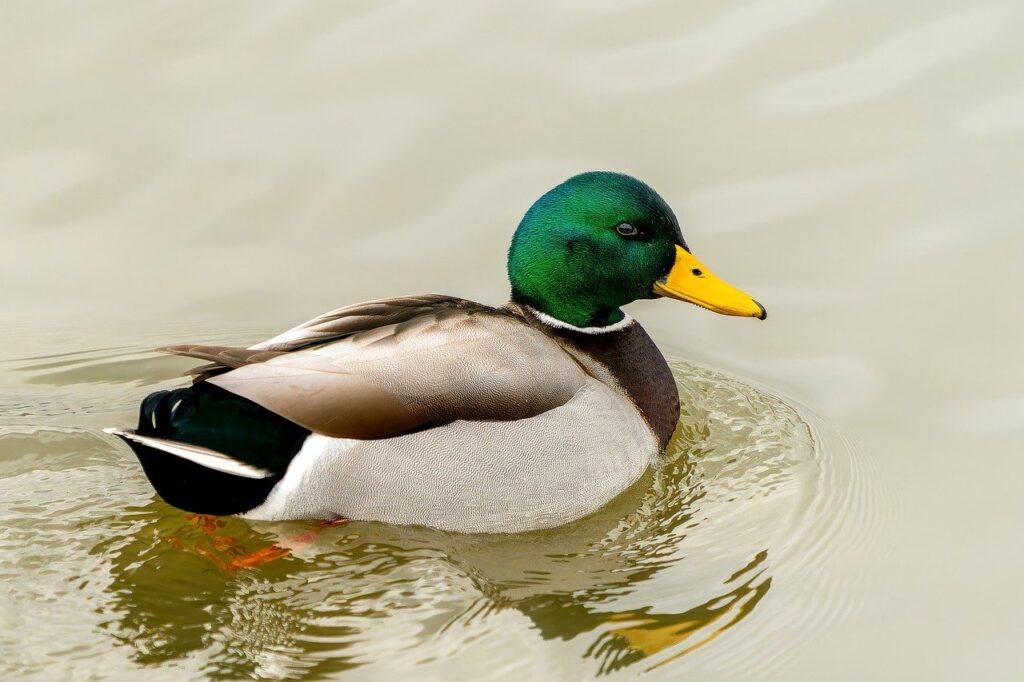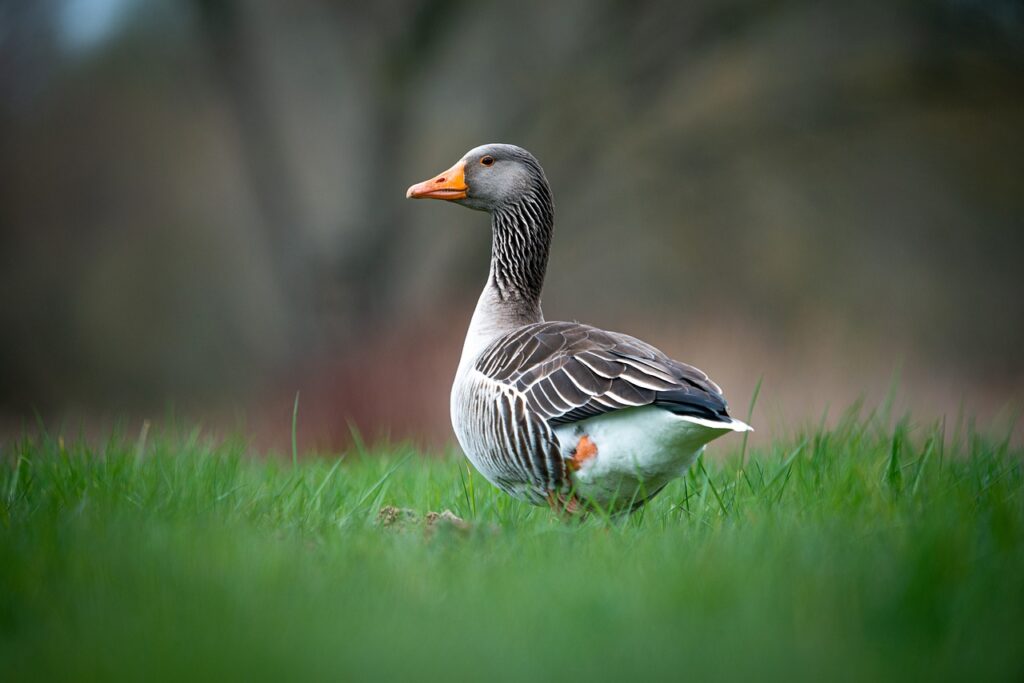Ducks are a common sight in ponds and lakes, and many people enjoy feeding them. While bread is a popular treat for ducks, some people wonder if marshmallows are a suitable alternative. After all, marshmallows are soft and easy to eat, and they are a sweet treat that many humans enjoy. However, the question remains: can ducks eat marshmallows?

Marshmallows are made primarily of sugar, corn syrup, and gelatin, and they are not a natural food source for ducks. In the wild, ducks feed on a variety of foods, including insects, small fish, and plants. While ducks may eat bread and other human foods, these items are not part of their natural diet and can cause health problems if consumed in large quantities. Therefore, it is important to understand the potential risks of feeding ducks marshmallows before doing so.
Table of Contents
Duck Dietary Basics
Ducks are omnivorous birds, meaning they eat both plants and animals. In the wild, they feed on a variety of foods such as seeds, aquatic plants, insects, and small fish. Domesticated ducks may also be fed commercial poultry feed, which is formulated to meet their nutritional needs.
Ducks require a balanced diet that provides them with the necessary nutrients for growth, reproduction, and overall health. These nutrients include protein, carbohydrates, fats, vitamins, and minerals. A lack of any of these nutrients can lead to health problems and poor growth.
It is important to note that ducks have a unique digestive system that allows them to digest and absorb nutrients from fibrous plant material. They have a muscular gizzard that grinds up food and a long intestine that extracts nutrients from the food. Therefore, a diet high in fiber is essential for their digestive health.
In summary, a balanced diet that includes a variety of foods such as seeds, plants, insects, and small fish is important for the health of ducks. Commercial poultry feed can also be used to meet their nutritional needs. A high fiber diet is essential for their digestive health.
Marshmallows and Duck Health
Nutritional Value
Marshmallows are a type of candy that is high in sugar and low in nutritional value. They are made from sugar, corn syrup, gelatin, and water. Marshmallows do not contain any essential nutrients that are required for a duck’s health. Therefore, feeding marshmallows to ducks should not be considered as a healthy option.
Potential Health Risks
Feeding marshmallows to ducks can cause health risks. Marshmallows are high in sugar, which can lead to obesity and other health problems in ducks. Overfeeding ducks with marshmallows can also cause digestive problems and diarrhea. Additionally, marshmallows may contain artificial colors and flavors, which can be harmful to ducks.
Ducks require a balanced diet that includes a variety of foods such as grains, vegetables, and insects. Feeding ducks with a diet that is high in sugar and low in nutritional value can lead to health problems. Therefore, it is recommended to avoid feeding ducks with marshmallows and other sugary treats.
Appropriate Treats for Ducks
Safe Human Foods
While ducks can eat a variety of foods, it is important to ensure that the treats they receive are safe for them to consume. Some safe human foods that can be given to ducks include:
- Grains: Ducks can eat grains such as wheat, corn, and oats. These can be fed to ducks in their whole form or as cracked grains.
- Fruits: Ducks enjoy fruits such as berries, melons, and apples. These should be cut into small pieces to prevent choking.
- Vegetables: Ducks can eat vegetables such as lettuce, spinach, and peas. These should be chopped into small pieces to make them easier to eat.
It is important to note that while these foods are safe for ducks, they should be given in moderation as treats and not as a replacement for their regular diet.
Natural Food Sources
Ducks are omnivores and can find food in their natural habitat. Some natural food sources for ducks include:
- Aquatic plants: Ducks can eat a variety of aquatic plants such as duckweed, water lilies, and cattails.
- Insects: Ducks enjoy eating insects such as worms, snails, and beetles.
- Small fish: Ducks can also eat small fish such as minnows and guppies.
It is important to avoid feeding ducks bread, crackers, and other processed foods as these can cause health problems for them. Additionally, it is important to ensure that any food given to ducks is free from mold and other contaminants.
Feeding Practices for Ducks
Feeding Frequency
Ducks should be fed once or twice a day, depending on their age and activity level. Young ducks require more frequent feedings, while older ducks can be fed once a day. It is important to establish a feeding routine and stick to it to avoid overfeeding or underfeeding the ducks.
Portion Sizes
The amount of food given to ducks should be based on their size and age. A general rule of thumb is to provide about 1/4 to 1/2 cup of food per duck per day. It is important not to overfeed the ducks, as this can lead to obesity and other health problems.
Feeding Environment
Ducks should be fed in a clean and dry area to avoid the growth of bacteria and other harmful organisms. It is also important to provide fresh and clean water for the ducks to drink, as ducks require water to help digest their food.
Feeding ducks can be a fun and rewarding experience, but it is important to follow these feeding practices to ensure the ducks remain healthy and happy.

Alternatives to Marshmallows
While ducks can eat marshmallows in moderation, it is important to remember that they are not a natural food for them. If you want to offer your feathered friends a treat, there are a few alternatives to marshmallows that they may enjoy.
1. Grains and Seeds
Ducks love to eat grains and seeds, which are a natural part of their diet. You can offer them cracked corn, wheat, barley, or oats. You can also mix different grains and seeds to create a tasty snack.
2. Fruits and Vegetables
Fruits and vegetables are another great option for ducks. They provide essential vitamins and minerals that can help keep your ducks healthy. You can offer them sliced apples, grapes, watermelon, or cucumber. Just make sure to cut them into small pieces to prevent choking.
3. Duck Feed
If you want to offer your ducks a treat that is specifically designed for them, you can give them duck feed. Duck feed is a balanced diet that contains all the nutrients that ducks need to stay healthy. You can find duck feed at your local pet store or online.
By offering your ducks these alternatives to marshmallows, you can provide them with a nutritious and tasty snack that they will love. Just remember to offer treats in moderation and always provide fresh water for your ducks to drink.
Understanding Duck Behavior
Ducks are omnivorous birds, which means they eat both plants and animals. They have a diverse diet that includes insects, snails, worms, and small fish. They also eat seeds, grains, and grasses.
Ducks are social animals and often feed in flocks. They have a unique way of feeding, called dabbling, where they dip their heads underwater and use their bills to sift through mud and water for food. They also graze on land, plucking food from grasses and other vegetation.
In terms of behavior, ducks are generally docile creatures. They are not aggressive towards humans unless provoked or threatened. However, they can be territorial and may become aggressive towards other ducks or animals that encroach on their space.
Ducks are also known for their strong homing instincts. They can navigate long distances using the position of the sun, stars, and Earth’s magnetic field. This makes them excellent migratory birds, traveling long distances to find suitable breeding and feeding grounds.
Overall, understanding duck behavior is important when considering their diet and feeding habits. While they may enjoy the occasional treat like marshmallows, it’s important to provide them with a balanced diet that meets their nutritional needs.

Responsible Duck Care
Ducks are delightful pets that can bring joy and entertainment to their owners. However, owning a duck requires a significant amount of responsibility. Here are some tips to ensure that you are providing the best care for your duck:
Housing
Ducks require a safe and comfortable living space. They need a shelter that protects them from extreme weather conditions and predators. A duck house should be spacious enough to allow them to move around freely and have access to food and water. It is essential to keep their living space clean and dry to prevent the growth of bacteria and fungi.
Diet
A duck’s diet should consist of a balanced mix of protein, carbohydrates, and vitamins. They should be fed a commercial feed specifically designed for ducks. While ducks enjoy treats, it is crucial to limit their consumption of sugary and fatty foods, such as marshmallows. Overfeeding them can lead to obesity and other health issues.
Exercise
Ducks need exercise to maintain their physical and mental health. They enjoy swimming, foraging, and exploring their surroundings. It is essential to provide them with a safe and secure outdoor space where they can roam freely.
Health
Ducks are susceptible to various health issues, such as respiratory infections, parasites, and injuries. It is essential to monitor their behavior and appearance regularly. Any signs of illness or injury should be addressed promptly by a veterinarian.
By following these tips, you can ensure that your duck is healthy, happy, and well-cared for.
Frequently Asked Questions
What foods are safe for ducks to consume?
Ducks can eat a variety of foods, including vegetables, fruits, grains, and seeds. Some of the safe options for ducks include lettuce, peas, corn, oats, and rice. It is important to note that ducks should not be fed bread, as it lacks necessary nutrients and can cause health problems.
Are marshmallows harmful to ducks if eaten regularly?
While marshmallows are not toxic to ducks, they should not be a regular part of their diet. Marshmallows are high in sugar and lack the necessary nutrients that ducks need to stay healthy. Overfeeding ducks with sugary treats like marshmallows can lead to obesity and other health issues.
Is it safe for ducks to eat marshmallows during colder seasons?
Ducks need a balanced diet to stay healthy, especially during colder seasons when their bodies require more energy to stay warm. While marshmallows are not harmful in moderation, they should not be relied upon as a source of nutrition for ducks during colder seasons.
Can ducks have sugary treats like marshmallows?
Ducks can have sugary treats like marshmallows in moderation, but they should not be a regular part of their diet. Feeding ducks too many sugary treats can lead to health problems like obesity, diabetes, and other issues.
What should ducks absolutely not eat?
Ducks should not be fed bread, chocolate, avocado, caffeine, alcohol, or any other human foods that are toxic to them. These foods can be harmful and even fatal to ducks.
Are there any risks associated with feeding ducks human snacks?
Feeding ducks human snacks can lead to overfeeding, which can cause health problems. Additionally, feeding ducks can cause them to become too reliant on humans for food, which can lead to issues with their natural foraging behaviors. It is important to feed ducks a balanced diet of foods that are safe for them to consume.





